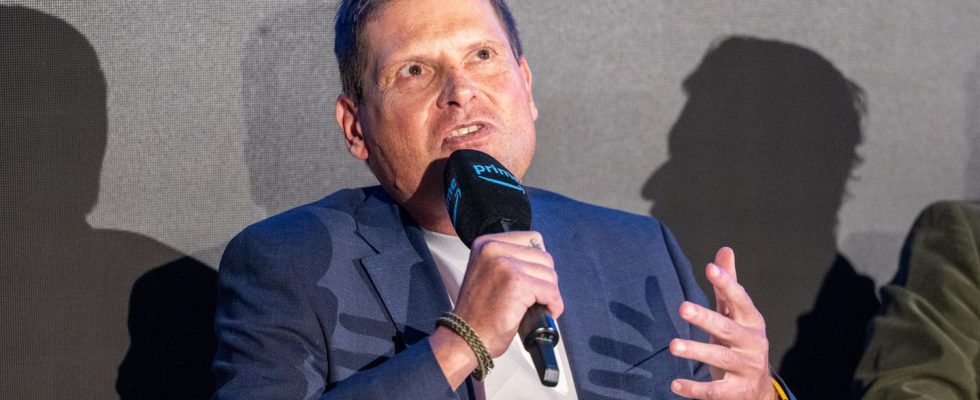New documentation
Jan Ullrich looks back on his life – and calls it “hell”
Jan Ullrich speaks about his life at the presentation of an Amazon documentary
© Ulrich Gamel/Kolbert-Press/DPA
Jan Ullrich was accompanied for two years for a documentary. During their introduction, the ex-professional cyclist talks about his past – and largely avoids one topic.
It was only a narrow stage in a Munich hotel that he sat on, and the audience was also small, and yet it was impressive Jan Ullrich nervously. He didn’t know what to do with his hands; his voice sometimes faltered. Ullrich had decided to tell “the truth,” as he announced. In his case, telling the truth could only mean making a doping confession.
Ullrich, 49 years old, a former professional cyclist for Team Telekom and winner of the Tour de France in 1997, then suffered quite a bit. The sentence “I doped” didn’t want to come out of his mouth. Ullrich made an indirect confession. He said his earlier claim that “I didn’t cheat on anyone was of course wrong” because he had already deceived his fans. For many years, since his suspension from Team T-Mobile immediately before the start of the 2006 Tour of France, Ullrich had always resorted to a rhetorical trick. According to his understanding, “I didn’t cheat anyone” meant: Because all the racers manipulated, I didn’t cheat. I was just one of many – ultimately there was equality of arms.
Documentary “Jan Ullrich – the hunted”
The reason for his appearance in Munich was the presentation of the documentary “Jan Ullrich – the Hunted”, which will be shown on Amazon Prime from November 28th. The first episode was shown, and in this Ullrich is more visible than before on stage. He admits that he did blood doping during a tour of Italy. He “had a bag,” says Ullrich, a plastic bag with medically prepared autologous blood. This was returned to the body via transfusion before the race. “When you get the blood back, you notice a surge,” says Ullrich in the documentary.
That’s almost all that Ullrich says on this topic. Ullrich calls the Spanish gynecologist Eufemiano Fuentes, whose main job was not gynecology but blood doping, a “very likeable person” who gave him the feeling: “I can trust him.”
Fallen Legends
Crash of Jan Ullrich: These sports stars also caused scandals after their careers
It would probably be wrong to accuse Ullrich of his dry statements about doping. In later episodes of the documentary series, Ullrich will speak more specifically and in detail about his manipulations, director Sebastian Dehnhardt indicated on Thursday evening in Munich. “We want to keep the tension high and not reveal too much.”
Doping at the 1997 Tour de France?
In fact, essential questions have not yet been answered: Was Ullrich also doped when he won the Tour in 1997? Who organized the doping? Was his team informed about the machinations – and possibly also the sponsor, Telekom? Why did Ullrich deny doping over the years when many of his former team members had already confessed in 2007?
Coming to terms with his former life as a racing driver was both painful and liberating for him, said Ullrich. He was accompanied for two years for the documentation. “A lot of tears were shed. I had sleepless nights, I had panic attacks. But I was able to throw off a backpack for myself.”
He calls his life “hell”
Ullrich today sees the lies in his life and his long silence about doping as the reason for his serious crisis five years ago: “I could no longer bear my past.” Back then, he “drank whiskey like water” and took cocaine. The drug excesses were massive, “it was a matter of life and death.”
Ullrich left it with hints on Tuesday evening; they were small insights into a life that he now calls “hell.” A life that is still untold. It will be interesting to see how much Ullrich will open up – and what the so-called whole truth will be for him.


